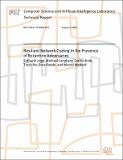Resilient Network Coding In the Presence of Byzantine Adversaries
Author(s)
Jaggi, Sidharth; Langberg, Michael; Katti, Sachin; Ho, Tracy; Katabi, Dina; Medard, Muriel; ... Show more Show less
DownloadMIT-CSAIL-TR-2006-053.pdf (339.0Kb)
Additional downloads
Other Contributors
Networks & Mobile Systems
Advisor
Dina Katabi
Metadata
Show full item recordAbstract
Network coding substantially increases network throughput. But since it involves mixing of information inside the network, a single corrupted packet generated by a malicious node can end up contaminating all the information reaching a destination, preventing decoding. This paper introduces the first distributed polynomial-time rate-optimal network codes that work in the presence of Byzantine nodes. We present algorithms that target adversaries with different attacking capabilities. When the adversary can eavesdrop on all links and jam Z links , our first algorithm achieves a rate of C-2Z, where C is the network capacity. In contrast, when the adversary has limited snooping capabilities, we provide algorithms that achieve the higher rate of C-Z.
Date issued
2006-08-05Other identifiers
MIT-CSAIL-TR-2006-053
Series/Report no.
Massachusetts Institute of Technology Computer Science and Artificial Intelligence Laboratory
Keywords
Coding Theory, Security, trust, & privacy, Network Coding, Byzantine Adversarie